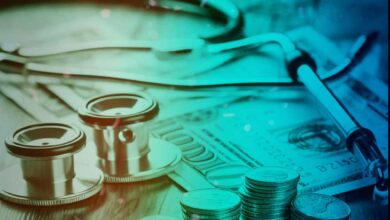Giant Pharmaceutical Companies Racing Against Time to Fight Coronavirus
International Efforts to Find Vaccine or Treatment that Eradicates the Virus
- Once the Chinese authorities published the genetic sequence of the virus in an open access database, international efforts to develop vaccines or drugs to combat coronavirus started accelerating.
- Giant pharmaceutical companies are racing against time to develop vaccines against coronavirus.
- Cross-border cooperation between countries all over the world to defeat the coronavirus.
International efforts to find vaccines or treatments for the new coronavirus (Covid-19) are accelerating. As global companies race to achieve the desired goal, the number of cases and deaths is significantly increasing in various countries across the world.
Global research and development institutions, along with giant pharmaceutical companies around the world, have set one goal: to quickly find drugs or vaccines to control the outbreak. Despite the huge budgets and several laboratory trials required, as well as human tests, some experiments around the world are being conducted.
Scientists in more than 36 global centers around the world are seeking to conduct pilot experiments to find a vaccine, especially after that one of the giant pharmaceutical companies has identified some of the antiviral compounds that may inhibit coronaviruses. However, it must be noted that even if the experiments go according to plan, it may take about 18 months for any potential vaccine to be publicly available.
Laboratory and clinical researchers have been working ceaselessly from the moment the virus spread. Countries are racing to be the first to save humankind from this rapidly-spreading virus which is considered one of the most dangerous in modern history.
Global Race
Scientists in each affected country are striving to find a treatment, one being the USA, where the Associated Press published a video showing a volunteer receiving the first dose of the potential vaccine.
The main objective of the experiment is to provide information on how three different doses of the vaccine (25, 100, and 250 mg) interact with the human body, and assess its safety. The secondary objective is to assess the body’s ability to generate immunity against the virus.
This experiment is the first step in developing a clinical vaccine, and we expect it to provide important information about safety and immunity. Forty-five volunteers are scheduled to participate in the remaining stages of the experiment, provided that they receive two doses separated by 28 days.
Great efforts are being made in this field also in China, as Beijing has authorized clinical trials.
A number of Chinese officials and academics have announced that some vaccines are expected to enter clinical trials as soon as possible. The Chinese authorities have officially given permission to begin the clinical trials for the first vaccine ever composed in the country against the virus.
A team of researchers led by Dr. Qin Wai, a Chinese academic, have obtained permission to start clinical tests. The report indicated that the preliminary tests have confirmed that their vaccine is safe and effective.
Some of the research teams also began to register volunteers and applied for China’s National Medical Products Administration to conduct the clinical trials, indicating that vaccine safety was a priority during the research and development process.
International Efforts
Although until now no vaccine has been approved, once the Chinese authorities published the genetic sequence of the virus in an open access database, international efforts to develop vaccines or drugs to ease the pain started accelerating.
China was the first to discover the genetic composition of the virus and shared the information with laboratories in other countries, which allowed specialists to synthesize this virus inside laboratories to monitor its specifications, strengths, and weaknesses.
China
In China, the country of origin of the coronavirus, clinical trials have already started on some drugs used to treat Ebola, HIV, SARS, and malaria. These trials aim to find out how effective these drugs are in treating coronavirus patients. A group of researchers also tested other antiviral drugs.
Clinical trials have started on a number of these drugs to test their effectiveness, and the results are to be included in a Chinese database of biomedical studies.
China has also called upon everyone who has recovered from the coronavirus to donate blood, as it may contain antibodies and valuable proteins that can be used to treat patients.
China was the first government to announce the allocation of the largest budget to fight the virus, as the Chinese central bank announced that it would pump 1.2 trillion yuan ($173 billion) into the economy to support efforts to fight the virus.
United States of America
In the USA, some biotech companies are examining HIV and Ebola drugs. The US National Institutes of Health (NIH) in Maryland are also looking for ways to encourage the human body to produce antibodies.
The US President Donald Trump has signed an emergency $8.3 billion budget to fight the virus, amid increasing cases in most states.
The Coalition for Epidemic Preparedness Innovations (CEPI) has allocated $11 million to three programs aimed at obtaining a candidate vaccine ready for human tests within 16 weeks.
The Food and Drug Administration (FDA) issued a license under “Urgent Emergency” category to adopt innovative technology to counter the spread of the coronavirus.
The Bill & Melinda Gates Foundation and two other large charities have pledged up to $125 million to help develop a treatment for the coronavirus. The US is discussing with health sectors efforts to combat the spread of the virus and is developing tests to detect it.
France
The efforts of the French giant pharmaceutical companies started to bear fruit through the anti-malaria drug that has shown promising results in treating coronavirus patients.
The French authorities have announced their intention to provide millions of doses of this drug, known as Plaquenil, which is made of hydroxychloroquine molecules, and which has been used for decades in the treatment of malaria and autoimmune diseases such as lupus and arthritis.
According to Elysee sources, the Ministry of Finance allocated a budget of $4 billion to fight the virus. The government spokesperson, Sibeth Ndiaye, said earlier that this clinical trial was “promising”, and more trials would be done on a larger number of patients.
In turn, Minister of Health Olivier Vérand said: “I have seen the results, and have given permission for other teams to conduct, as soon as possible, a more comprehensive experience on a larger number of patients.” The Minister expressed the hope that “these new experiences confirm the interesting results” obtained by Professor Raul, stressing “the absolute importance that any decision related to a general health policy be based on reliable scientific data and unambiguous verification processes.”
Germany
The government announced earlier that the country has allocated 1 billion euros to support the health sector efforts to reduce the spread of the virus, and for medical experts to discover a vaccine.
Germany is now trying to find a vaccine or treatment for this pandemic, as it is well known for its effective laboratories in the pharmaceutical industry where companies are expecting to develop an anti-virus vaccine in a short time.
Japan
Japan, in turn, seeks to find a vaccine or a drug to protect against the virus, as curators are conducting studies in this regard through the use of super computers to analyze some of the available drugs, and use them to treat coronavirus patients. Pharmaceutical companies are developing a new drug using plasma derived from blood taken from recovered coronavirus patients, based on the ability of the antibodies developed by patients to strengthen the immune system of new patients.
Britain
In Britain, the start of the commercial production of new antibodies that may treat the coronavirus has been announced. Researchers from the Imperial College University in London have announced the start of experiments using mice, hoping to reach their goal by the end of the year. Once the first experimental stage is completed, the effectiveness of the vaccine in humans will be tested. A final vaccine is expected by the end of the year.
The British government has announced that significant progress has been made in terms of composing an anti-virus vaccine to be ready in the spring of 2021, according to the government’s chief scientific adviser, Patrick Vallance.
Australia
Laboratory work in Australia has apparently gone a long way. Researchers from Brisbane say they are indeed on their way to find a treatment for the virus. The Doherty Institute in Melbourne is also working on finding a treatment through researching and studying a live sample of the virus, through which researchers at the Australian Animal Health Laboratory in Geelong may begin to understand its characteristics, which is a critical step in the global effort to develop a vaccine.
Laboratory research and clinical trials in Australia concern a drug that treats malaria, and another that is prescribed for AIDS patients. Both drugs managed to eliminate the coronavirus during laboratory experiments, but without human trials it is not possible to confirm their absolute effectiveness. Therefore, researchers are communicating with hospitals to conduct these experiments, and if they succeed, it is possible to announce the final result within three months. The obstacle here is not only the time, but also the money allocated for the experiments. The researchers need approximately $750,000 to finance the process.
Stages of the Vaccine
The vaccine needs several tests and stages in addition to clinical trials before being ready for human use. According to the US Centers for Disease Control and Prevention (CDC), the development of the vaccine goes through a number of stages.
The first stages of the vaccine development lie in understanding its characteristics and behavior in the host, which is difficult to know regarding coronavirus due to the difficulty of knowing the pattern of its spread between cases and countries. Second comes testing it on animals, then on humans to test the immune responses in small numbers of volunteers who are not at risk of disease.
Any country that succeeds in finding a vaccine against Covid-19 will achieve a great victory, as it will be a source that generates billions and pushes the country to the forefront in this field for decades.
It should be noted that attempts to find the vaccine are not carried out in each country separately. Laboratories and international pharmaceutical companies have expanded their international cooperation with the aim of conducting joint plans to develop a vaccine against the virus. The reason for this is that developing a vaccine requires huge budgets, in addition to the need of a lot of trials and tests before making it publicly available.
















